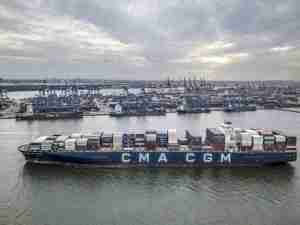By George Lauriat, Editor-in-Chief, AJOT
Bart Goedhard, President and Chief Executive Officer of the Propeller Club of the United States, is a tough man to catch at this time of year. The organization's annual convention will be held in Boston from October 4-7 at the Fairmont Copley Plaza Hotel. The real challenge for Goedhard and the host of organizers is to work out the final details of a highly informative and complex conference agenda. Among this year's panel topics are: "The Liquid Natural Gas ' A Global Thirst; Changes in Cruise Ships ' New Routes, Ports & Vessels; Global Growth ' Containers, Terminals, Ports, Logistics & Security."
The Propeller Club is the US maritime industry's preeminent organization. The non-profit organization was formed in 1927, with individual member clubs designated as "Ports." Membership comprises a cross section of the maritime industry throughout the US and in many port-cities overseas.
"The Propeller Club is dedicated to the enhancement and well being of all interests of the maritime community on a national and international basis," Goedhard told the AJOT. "It is the only grassroots organization representing the US maritime interests and as such is an invaluable bridge between Congress and the industry."
The very concept of the Propeller Club was born out of the necessity to project the industry's viewpoint. The idea for the club began in 1922 when the "Ship Subsidy Bill" was engaging Congressional attention.
A small group of concerned businessmen began meeting daily at a luncheon to talk over industry issues. Over a short time the luncheon group became larger. Eventually this led to the inception of the Propeller Club of the Port of New York on January 24, 1923. As the New York meetings grew in size and scope they caught the attention of industry leaders in Boston. On February 3, 1927 the "port" was added. New Orleans followed a short time later, and soon the Propeller Club established itself as the principal industry association.
Each annual conference and convention is a little different. This year's panels have a strong LNG content to go along with issues on the cruise business and intermodal operations.
"It starts about five year's out," Goedhard explained, "when a host Port solicits the annual conference. Potential themes with a local slant are discussed. For example, next year is Norfolk and much of the program will be allocated to defense, MSC (Military Sealift Command) and US force support and the building of the new APM terminal," Goedhard said.
The host Port, through the ad hoc committee, looks for the "hot topics" and eventually a plan is put together. Goedhard said that as the conference date nears there is daily interaction with headquarters to hammer out the final details involving speakers and logistics for the conference.
Goedhard himself is familiar with both coasts. He worked as a boarding agent in Norfolk before moving to Seattle to work for a tugboat firm. Although he was active in the Propeller Club in Norfolk, in Seattle he became very interested in the Club. When the headquarters job came up five years ago he moved to Fairfax, VA.
Although the Propeller Club has never wavered in its support of a US Flag merchant marine, and US flag interests, in recent years the organization has broadened it's scope internationally. "The international organizations are the largest growth areas," Goedhard said. In fact the organization has around 7,000 US members and 3,200 members overseas. This might seem like a conflict to the Club's goals of promoting US flag shipping. But as Goedhard explains, "Everybody recognizes each others' cabotage laws. We [the Propeller Club] embrace a working together attitude towards international waterborne commerce."
In a sense, overseas expansion is the key to the Propeller Club's future. The club's overseas roles have been growing. Recently added








